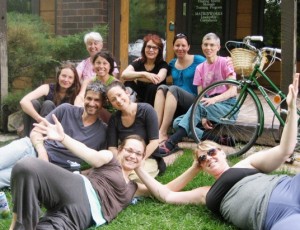Self-Regulation & Intimacy:
Healthy Boundaries, Bonding and Attachment
This module is an introduction to Integrative Somatic Psychotherapy (ISP). It may be taken by itself or as part of the complete training program.
In this dynamic workshop, students learn the somatic and psychological skills to self-regulate emotional states, to have healthy boundaries, and to form healthy relationships. A powerful model is given to unhook co-dependent behavior. With safety and support, meaningful and loving relationships are possible. With movement and breathing exercises, lectures, and demonstrations sessions, students learn these skills from the inside out. An energetic model is shared for conducting body-centered sessions that integrates healthy relationship skills, multi-generational family patterns, character styles, the body, breath work, empowerment, and conscious use of the therapeutic relationship. This is a powerful workshop for personal healing and for gaining skills to use with others.
Healing Ancestral Trauma
Who we are in the moment often has its roots in the generations of the past. When a trauma is unresolved, it is frozen in time and is passed down in the body of the next generation. Students learn to listen to these family themes and to hold the energetic field of the ancestors. In this way, past traumas can unwind and breathe with the healing support of the present. This is an energetic approach to family systems theory. Topics include themes such as war, immigration, divorce, birth order, bonding and attachment, unconscious gender roles, and sexuality.
Character Styles and Self-Development
In this module, students gain a greater understanding of the psychology and transference dynamics that occur throughout a session. When a client is reliving memories of abandonment, for instance, a therapist responds differently than if the client is feeling inundated. Likewise, issues of shock and dissociation require a unique set of skills and pacing. The same is true with themes of merging and co-dependency. This map helps a therapist to adjust the quality of contact, the physical distance, and the tempo of the therapeutic process. In this way, a therapist can read the body of a client to keep the sessions on track, alive and dynamic. Videos illustrate the body type of each character style.
Somatic Skills and the Body Systems:
Students learn to inhabit the fluids, organs, muscles and bones with greater presence. Movement patterns are explored from the prenatal period, to crawling, to birth. In this way, the healthy development of the self is learned in the body tissue. Breath work techniques are taught to increase body awareness and to release outdated holding patterns. Students learn to track and manage the level of charge in a session with safety, respect and skill. Psychological content is gracefully woven with somatic process to allow greater empowerment and presence in the moment.
Navigating Shock and Trauma:
In this module, students learn to track the autonomic nervous system (ANS) from fight and flight to the freezing and immobility response. Students learn to unhook frozen sympathetic and para-sympathetic shock patterns. Skills are taught to support the natural ability of the body-mind to heal. Traumas such as car accidents, war or abuse are explored and integrated with a developmental relationship model.
The Prenatal Journey
In the prenatal period, the body takes form in the energetic field of the mother, father and larger family systems. Beginning as undifferentiated fluid, the organs, muscles, nerves and bones take shape. With movement exercises and guided visualizations students explore this early time period. Psychological themes are discussed such as divine homesickness, incarnation shock, being wanted, attachment and bonding to the uterine wall, umbilical toxins, twin loss and others. These early experiences often carry the imprints for later relationship patterns. As these are released, one learns to inhabit the body with a fuller sense of self, open heart, and connection to spirit. Along with its healing benefits, this period also provides a powerful opportunity to study consciousness in the fluids and organs. This strengthens a therapist’s skills and ability to track energy regardless of whom they work with.
The Birth Journey
Birth is a powerful rite of passage for mother and child. From the baby’s perspective, the pressures are intense and the labor is long. With presence and sensitivity, this shared journey can be a time of great bonding and accomplishment. Oxytocin levels bring mother and child together. The cranial sacral tides of the baby ignite. If, however, there is trauma or pain medication, then these too are stored in the body tissue. As an adult, stressful projects, or intimate relationships, will often reawaken these unconscious memories. In this module, themes are covered such as the use of forceps, anesthesia, induction, cesarean section, difficult labors and others. Understanding how birth dynamics can be linked to relationship patterns is a powerful training for a body-centered psychotherapist. It also deepens one’s ability to track energy in the organs, muscles and bones.
Relationship Counseling & Sexuality
Having healed one’s prenatal and birth injuries (or at least set the process in motion), more energy, presence and heart is available for relationship. In this module, students learn an energetic approach to marital therapy. Skills are taught to teach couples how to stay empowered and open with one another. Reading the energy in a couple’s session allows a therapist to quickly diagnose the underlying obstacles. Playful and insightful exercises are shared. An energetic model for sexual counseling is introduced. This is a fun class with many practical skills.
Integration & Skill Building
This last module is a time for further skill building and to integrate the training. Special topics are discussed. Supervision provides a link to real world clients. Practice sessions with other students are an opportunity to hone technique. This is also a time for closure and celebration.
About ISP Training Price and Logistics Calendar Articles
